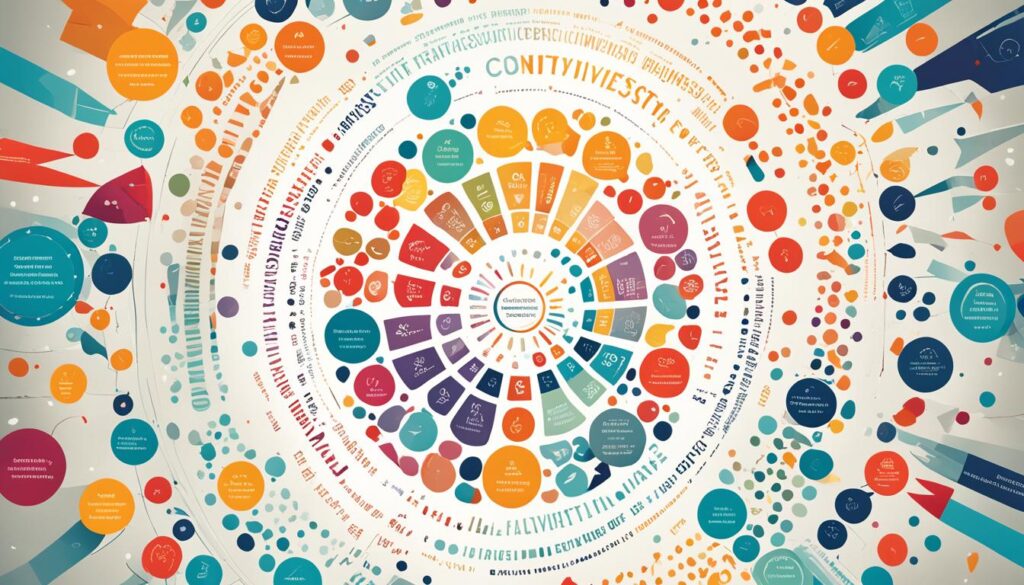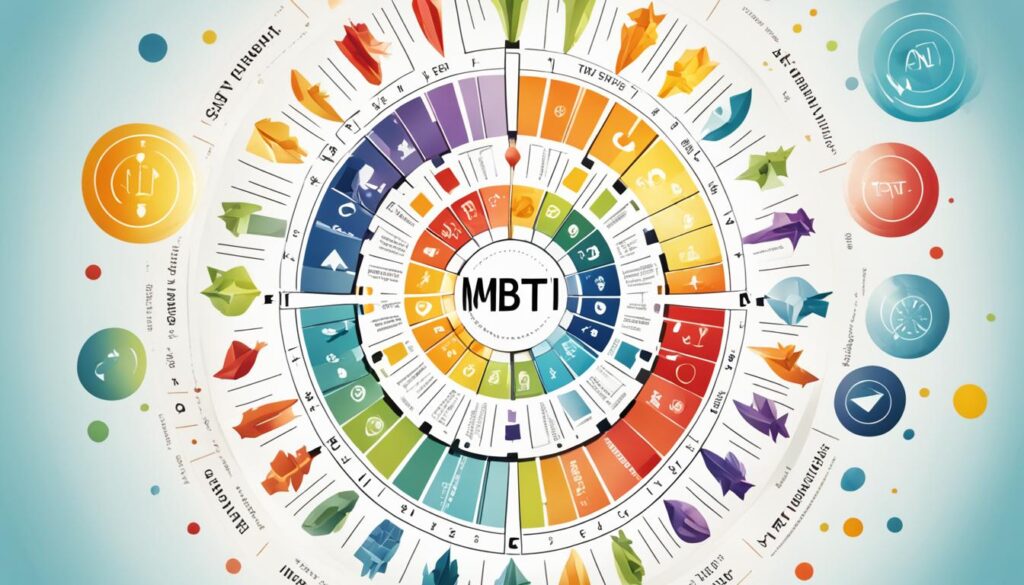Have you been informed that self-reflection essays centered on personality assessments are now considered a valuable tool for personal development and insight? These essays, often referred to as 16 Personality Test Reflection Papers, provide a chance for individuals to delve into and evaluate their own personalities, revealing key insights into their strengths, weaknesses, and opportunities for growth.
Through a combination of self-awareness questions, the Big Five Personality Test, surveys on Negative Affectivity and Emotional Intelligence, and the MBTI test, individuals delve deep into the complexities of their personalities, enabling them to make informed decisions about their personal development, career choices, and relationships.
Key Takeaways:
- 16 Personality Test Reflection Papers are self-reflection essays that provide valuable insights into an individual’s personality.
- Through self-awareness questions, individuals can better understand their personal interests and motivations, fostering self-motivation and personal growth.
- The Big Five Personality Test reveals key traits such as openness, extraversion, conscientiousness, agreeableness, and neuroticism, giving individuals a comprehensive understanding of their personality.
- Negative Affectivity and Emotional Intelligence surveys provide insights into an individual’s mood, stress levels, and ability to understand and regulate emotions.
- The MBTI test assesses personality type, strengths, and preferences, helping individuals gain clarity on potential career paths and personal growth opportunities.
Understanding Self through Self-Awareness Questions
Self-awareness is a powerful tool for personal growth and development. By asking ourselves thought-provoking questions, we can gain deeper insights into our personality traits, personal interests, and self-motivation. Self-awareness questions allow us to explore the core aspects of our identity and understand what truly drives us.
One way to foster self-awareness is by examining our personality traits. What are our strengths and weaknesses? What qualities and characteristics define us? By understanding our unique personality, we can leverage our strengths and work on areas that need improvement. For example, we might discover that we excel in communication skills, but struggle with time management. This awareness guides us towards continuous self-improvement and motivates us to become our best selves.
“Knowing yourself is the beginning of all wisdom.” – Aristotle
Another avenue for self-growth is exploring our personal interests. What activities, hobbies, or subjects bring us joy and fulfillment? By identifying our passions, we can set goals and pursue meaningful experiences that align with our interests. Discovering our personal interests allows us to cultivate a sense of purpose and nurture our self-motivation.
It’s important to note that self-awareness questions help us overcome obstacles that may hinder our personal growth. Comparison to others and fear of failure can often hold us back. However, by understanding ourselves better, we can break free from these barriers and embrace our unique journey.
Self-Awareness Questions: A Starting Point for Personal Growth
Here are some self-awareness questions to kickstart your personal growth journey:
- What are my strengths and how can I further develop them?
- What are my weaknesses and how can I overcome them?
- What are my core values and how do they guide my decisions?
- What activities or hobbies ignite my passion and bring me joy?
- What are my long-term goals and how can I work towards achieving them?
- What fears or limiting beliefs are holding me back, and how can I overcome them?
As we embark on the journey of self-discovery, self-awareness questions serve as a compass, guiding us towards personal growth, fulfillment, and a deeper understanding of ourselves.

Insights from the Big Five Personality Test
The Big Five Personality Test offers valuable insights into key traits that shape our personalities. By understanding these traits, individuals can gain a deeper self-awareness and make informed decisions about personal growth, relationships, and career paths.
The Big Five model categorizes personality traits into five dimensions: openness, extraversion, conscientiousness, agreeableness, and neuroticism. Each dimension provides unique insights into our behavior, preferences, and interactions with others.
- Openness: A high score in openness indicates a creative and adventurous nature. Open individuals are curious, open-minded, and willing to explore new ideas and experiences.
- Extraversion: This dimension reflects a preference for social interactions. Extraverts thrive in social settings, enjoy being around people, and gain energy from socializing.
- Conscientiousness: Conscientious individuals are self-disciplined, organized, and goal-oriented. They prioritize responsibilities, adhere to deadlines, and strive for excellence.
- Agreeableness: Agreeable individuals value harmony, empathy, and cooperation. They are considerate of others’ feelings, seek to avoid conflicts, and prioritize building positive relationships.
- Neuroticism: A low score in neuroticism indicates emotional stability and resilience. Individuals with low neuroticism scores are calm, composed, and better at handling stressful situations.

The Big Five Personality Test provides valuable insights into our unique traits and helps us understand ourselves better. By leveraging this knowledge, we can make choices that align with our strengths and values, fostering personal growth and fulfillment.”
Understanding how these dimensions interact within us can guide personal development, improve communication, and enhance relationships. It’s important to note that these traits exist on a continuum, and each individual possesses a unique combination of them.
By reflecting on the insights gained from the Big Five Personality Test, we can embrace our strengths, overcome challenges, and nurture personal growth. The next section explores the impact of two other assessments: Negative Affectivity and Emotional Intelligence, in further uncovering our personalities and fostering overall well-being.
Exploring Negative Affectivity and Emotional Intelligence
Negative Affectivity and Emotional Intelligence are essential components of understanding and managing our emotions. Negative Affectivity surveys provide insight into our mood and stress levels, while Emotional Intelligence assessments help us gauge our self-emotion appraisal, others-emotions appraisal, use of emotion, and regulation of emotion.
Stress and mood fluctuations can significantly impact our well-being and hinder personal growth. By utilizing Negative Affectivity surveys, we can gain valuable insights into our emotional state and identify stress triggers. This knowledge empowers us to take proactive steps towards managing stress and improving our overall mood.
Emotional Intelligence, on the other hand, focuses on our ability to understand and control emotions effectively. By assessing our self-emotion appraisal, we can develop self-awareness and gain a better understanding of how our emotions impact our thoughts and behaviors. Furthermore, by measuring others-emotions appraisal, we can enhance our empathy and emotional connection with those around us.
Developing Emotional Intelligence is crucial for personal growth and establishing harmonious interpersonal relationships. When we possess a high level of Emotional Intelligence, we can navigate challenging situations with grace, communicate effectively, and contribute positively to our interactions with others.
To summarize:
| Negative Affectivity | Emotional Intelligence |
|---|---|
| Provides insights into mood and stress levels. | Measures self-emotion appraisal, others-emotions appraisal, use of emotion, and regulation of emotion. |
| Helps identify stress triggers and improve overall mood. | Fosters self-awareness and understanding of how emotions shape thoughts and behaviors. |
| Enhances empathy and emotional connection with others. |

Understanding Negative Affectivity and developing Emotional Intelligence are valuable tools for personal growth and nurturing fulfilling relationships. Embracing these insights allows us to navigate the complexities of emotions, manage stress effectively, and cultivate a positive mindset.
Unveiling Personality through the MBTI Test
The Myers-Briggs Type Indicator (MBTI) test is a powerful tool for understanding personality type, strengths, and preferences. By taking the MBTI test, individuals gain valuable insights into their unique characteristics and how they interact with the world around them.
The MBTI test categorizes individuals into different personality types based on four key dimensions: extraversion (E) or introversion (I), intuition (N) or sensing (S), thinking (T) or feeling (F), and judging (J) or perceiving (P). Each personality type is a combination of these four dimensions, offering a comprehensive view of one’s personality and behavior.
An ENTJ personality type, for example, is characterized by extraversion, intuition, thinking, and judging. ENTJs are natural leaders who thrive in dynamic environments. They are known for their strategic thinking, problem-solving abilities, and decisive nature. With strong communication skills and a passion for achievement, ENTJs excel in management and leadership positions.
When individuals understand their personality type through the MBTI test, they gain valuable insights into their strengths, preferences, and potential career paths. This awareness allows them to make informed decisions about their personal and professional lives, maximizing their potential for success and fulfillment.
ENTJ Personality Type
Here is a breakdown of the characteristics associated with the ENTJ personality type:
| Dimension | Trait |
|---|---|
| Extraversion (E) | – Energized by social interactions – Outgoing and assertive – Enjoys leading and being in charge |
| Intuition (N) | – Takes a big-picture approach – Seeks patterns and possibilities – Future-oriented thinker |
| Thinking (T) | – Logical and objective – Analyzes situations and makes rational decisions – Values fairness and justice |
| Judging (J) | – Organized and structured – Prefers planning and following schedules – Seeks closure and resolution |
ENTJs thrive in challenging environments that allow them to exercise their leadership skills and put their strategic thinking into action. They are driven by a desire for achievement and are often found in roles that require vision, organization, and an ability to motivate others.
“The ENTJ’s main interest in life is to lead their organizations towards a better future. They can envision the future with such clarity that others may be taken aback. The ENTJ has the ability to visualize complex situations and analyze them quickly in order to find strategic solutions.” – CPP
By understanding their ENTJ personality type, individuals can leverage their natural strengths and preferences to pursue meaningful career paths, build successful teams, and make a positive impact on their organizations and communities.

With the MBTI test as a guide, individuals can gain a deeper understanding of themselves, enabling personal growth, improved relationships, and enhanced career satisfaction. By unlocking the secrets of personality type, we can embark on a journey of self-discovery, harnessing our strengths and embracing our true potential.
Embracing Personal Growth and Development
At the heart of self-improvement lies the journey towards personal growth and development. Through self-reflection and understanding of our personality, we can unlock our true potential and become the best version of ourselves. In this section, we delve into the importance of recognizing our strengths and weaknesses, setting goals, and cultivating self-motivation.
By taking the time to reflect on our experiences, values, and beliefs, we gain valuable insights into who we are and what drives us. This self-awareness forms the foundation for personal growth, as it allows us to identify areas where we can improve and leverage our strengths.
Recognizing Strengths and Weaknesses
Understanding our strengths and weaknesses is crucial for personal growth. It enables us to capitalize on our strengths and find ways to address areas for improvement. By acknowledging our strengths, we can channel our efforts towards activities and pursuits that align with our natural abilities, fostering a sense of fulfillment and accomplishment.
Similarly, acknowledging our weaknesses empowers us to take steps towards self-improvement. By identifying areas where we may have challenges, we can seek opportunities for growth, whether through learning new skills, seeking mentorship, or collaborating with others who complement our weaknesses.
Setting Goals for Personal Growth
Goal setting is a powerful tool that propels us forward in our personal growth journey. By setting clear and achievable goals, we create a roadmap for success and give ourselves something to work towards. Goals provide us with direction, focus, and a sense of purpose, driving us to continuously strive for improvement.
When setting goals for personal growth, it’s important to make them specific, measurable, attainable, relevant, and time-bound (SMART). This approach ensures that our goals are realistic and actionable, maximizing our motivation and commitment to achieving them.
Cultivating Self-Motivation
Self-motivation is the fuel that keeps us moving forward on our personal growth journey, even when faced with challenges or setbacks. It is the inner drive and determination that pushes us to overcome obstacles and stay focused on our goals.
To cultivate self-motivation, it’s essential to stay connected to our passions, values, and purpose. By aligning our actions with what truly matters to us, we tap into a powerful source of intrinsic motivation. Additionally, surrounding ourselves with a supportive network of like-minded individuals who inspire and encourage us can further boost our self-motivation.

Embracing personal growth and development is a lifelong journey. It requires continuous self-reflection, goal setting, and self-motivation. By recognizing our strengths, addressing our weaknesses, and setting meaningful goals, we can unlock our full potential and make a positive impact in the world.
Next, we explore the power of personality assessments in gaining further insights into ourselves and leveraging them for personal and professional success.
The Power of Personality Assessments
Personality assessments are valuable tools that provide deep insights into our strengths, weaknesses, and preferences. They offer a unique opportunity for self-awareness and understanding, enabling us to make informed decisions about personal development, career choices, and interpersonal relationships.
These assessments act as a solid foundation for personal growth. By gaining a deeper understanding of ourselves, we can identify our unique talents and areas where we may need improvement. Armed with this knowledge, we can take intentional steps towards enhancing our strengths and working on our weaknesses.
When it comes to making career choices, personality assessments can be instrumental. They highlight our natural inclinations, helping us align our career paths with our true passions and abilities. By recognizing our personality traits and preferences, we can make informed decisions about the industries, roles, and work environments that are most likely to bring us fulfillment and success.

Furthermore, personality assessments empower us to navigate interpersonal relationships effectively. By understanding our own communication styles and preferences, we can communicate more clearly and connect better with others. Likewise, by understanding the personalities of those around us, we can adapt our communication and collaboration approaches to foster positive and productive relationships.
“Personality assessments are like a mirror that reflects who we truly are. With their guidance, we can uncover our hidden potential and embark on a journey of personal growth and self-discovery.” – Unknown
By actively engaging with personality assessments, we gain the power to shape our lives and harness our full potential. They provide us with a roadmap for personal development, paving the way for continuous growth and self-improvement. Armed with this self-awareness, we can confidently navigate the complexities of life, make wise decisions, and build meaningful connections with those around us.
Benefits of Personality Assessments:
- Gain self-awareness and understanding
- Identify strengths and areas for improvement
- Make informed decisions about career choices
- Navigate interpersonal relationships effectively
- Empower personal growth and self-improvement
The Impact of Learning Styles
Our preferred learning styles play a significant role in our personal growth and development. Understanding how we learn best allows for tailored learning experiences and maximized knowledge acquisition. One popular method of categorizing learning styles is through the Kolb Learning Styles Inventory.
The Kolb Learning Styles Inventory identifies four different learning styles:
- Assimilators: These learners prefer reflection and conceptualization. They excel in creating theoretical models and are able to analyze complex information.
- Convergers: These learners prefer practical application and experimentation. They excel in problem-solving and decision-making.
- Divergers: These learners prefer a hands-on and imaginative approach. They excel in generating ideas, brainstorming, and exploring different perspectives.
- Accommodators: These learners prefer active experimentation and real-life experiences. They excel in adapting to new situations and are willing to take risks.
By recognizing our preferred learning methods, we can leverage our strengths to optimize our learning experiences. If you identify as an assimilator, you may find that reflecting on new information and connecting it to existing knowledge is the most effective way for you to learn. On the other hand, if you are a converger, hands-on experiments and practical applications might be more beneficial for your learning.
Ultimately, understanding and embracing our learning styles enhances our personal growth journey. It allows us to choose the most suitable learning strategies, engage in activities that align with our strengths, and foster a positive learning environment. By tailoring our learning experiences to our individual preferences, we can enhance our knowledge acquisition and personal development.

Learning Styles Comparison
| Learning Style | Strengths | Preferred Learning Methods |
|---|---|---|
| Assimilators | Analytical thinking, conceptualization | Reflection, abstract thinking, theory building |
| Convergers | Practical problem-solving, decision-making | Experimentation, hands-on applications |
| Divergers | Creativity, exploring different perspectives | Imagination, brainstorming, hands-on activities |
| Accommodators | Adaptability, risk-taking | Real-life experiences, active experimentation |
The Insights of the Enneagram
The Enneagram Personality Test provides valuable insights into our core motivations, fears, and desires, categorizing individuals into one of nine types. This powerful tool aids in better understanding ourselves and our relationships with others.
One of the nine Enneagram types is Type 4, also known as the Individualist or Romantic. Individuals belonging to this type are characterized by introspection, emotional expression, and a deep desire for authenticity in their lives.
Introspection is a prominent quality of Type 4 individuals. They have a natural inclination to reflect on their experiences and explore their inner world. This self-awareness helps them gain a deeper understanding of themselves and their emotions, allowing for personal growth and development.
Emotional expression is another key aspect of Type 4. They have a rich and vivid emotional life and are highly attuned to their feelings. This emotional intensity often fuels their creativity and artistic pursuits, making them highly imaginative and passionate individuals.

The Enneagram test offers valuable insights into our core fears and desires, illuminating the driving forces behind our behavior. Type 4 individuals have a fundamental fear of being insignificant or lacking a unique identity. They desire to be seen and understood for their authentic selves, longing for deep connections and meaningful relationships.
By uncovering these core motivations, fears, and desires, the Enneagram test empowers individuals to navigate their personal lives with greater self-awareness. It sheds light on their tendencies, strengths, and areas for growth, fostering personal development and healthier relationships.
| Enneagram Type | Core Motivations | Fear | Desire |
|---|---|---|---|
| Type 1 – The Perfectionist | Striving for integrity and perfection | Fear of making mistakes | Desire for balance and improvement |
| Type 2 – The Helper | Seeking love and connection through service | Fear of being unloved or unwanted | Desire to feel appreciated and valued |
| Type 3 – The Achiever | Driven by success and recognition | Fear of failure and being unremarkable | Desire for admiration and validation |
| Type 4 – The Individualist | Yearning for unique identity and authenticity | Fear of being insignificant or lacking personal significance | Desire to be seen and understood for their true selves |
| Type 5 – The Investigator | Seeking knowledge and understanding | Fear of being overwhelmed or invaded | Desire for privacy and self-sufficiency |
Enneagram Types, Core Motivations, Fear, and Desire
The Hogan Personality Inventory and Career Outlook
When it comes to career aspirations, understanding our personality traits can be a game-changer. That’s where the Hogan Personality Inventory comes in. This assessment provides valuable insights into our unique characteristics and how they relate to our professional goals.
Ambition plays a pivotal role in driving success and accomplishment. It fuels our desire to excel and push boundaries, propelling us towards our career aspirations. By harnessing this ambition and aligning it with our personality traits, we can make informed choices about our professional development and work towards fulfilling careers.
One crucial aspect that the Hogan Personality Inventory emphasizes is self-discipline. This trait is essential for setting goals, staying focused, and persevering in the face of challenges. It enables us to maintain productivity and drive in the pursuit of our career objectives.
Let’s take a closer look at how the Hogan Personality Inventory assesses various personality traits and influences our career outlook. By understanding our unique traits and aligning them with our ambitions, we can unlock our full potential and chart a path towards success.

| Personality Trait | Career Outlook |
|---|---|
| Ambition | Ambition drives individuals to set high goals and strive for success in their chosen careers. It fuels their determination and commitment, propelling them towards leadership roles and opportunities for growth. |
| Self-Discipline | Self-discipline is crucial for achieving career goals. Individuals with a high level of self-discipline possess the ability to stay focused, manage their time effectively, and adhere to plans and deadlines. This trait promotes consistency and ensures long-term success. |
| Personality Compatibility | The Hogan Personality Inventory also assesses personality compatibility in the workplace. Understanding how our personality traits align with different work environments and teams helps us make informed decisions about career choices and enhances our ability to thrive in collaborative settings. |
By leveraging the insights gained from the Hogan Personality Inventory, we can make more informed choices about our career paths. Whether it’s selecting a specific industry, pursuing leadership roles, or identifying areas where we can enhance our skills, this assessment serves as a valuable tool for professional development.
Incorporating Hogan Personality Inventory Insights
The Hogan Personality Inventory provides us with a comprehensive understanding of our career aspirations, ambition, self-discipline, and personality compatibility. Armed with this knowledge, we can make strategic decisions to align our personal traits with our professional goals.
For instance, if our Hogan Personality Inventory results indicate a high ambition and a drive for leadership positions, we can channel our energy towards career paths that offer opportunities for growth and advancement. On the other hand, if self-discipline is an area that we need to work on, we can focus on developing time management skills and creating actionable plans to stay on track.
Ultimately, the Hogan Personality Inventory empowers individuals to take charge of their career outlook by identifying areas for improvement and capitalizing on their inherent strengths. By embracing the insights provided by this assessment, we can make informed decisions, maximize our potential, and pave the way for a fulfilling professional journey.
Exploring Mental Health and Personality with the MMPI
The Minnesota Multiphasic Personality Inventory (MMPI) is a widely used psychological test that assesses both mental health and personality traits. It provides valuable insights into areas of concern as well as potential strengths related to mental health. By understanding our personality traits and emotional stability, we can take important steps towards improving our overall well-being.
One of the key benefits of the MMPI is its ability to assess mental health. It helps identify indicators of psychological disorders such as depression, anxiety, and bipolar disorder. Additionally, the MMPI can assess personality traits that may impact our well-being, such as impulsivity, introversion/extroversion tendencies, and levels of neuroticism.
Understanding our mental health is vital for promoting a positive sense of well-being. By identifying areas of concern through the MMPI, we can seek appropriate support, therapies, or interventions to address them. This contributes to our overall mental and emotional well-being, enabling us to lead happier and more fulfilling lives.
Moreover, the MMPI also provides insights into our personality traits, which play a significant role in shaping our well-being. By understanding our personality profiles, we gain self-awareness and can make informed decisions that align with our strengths and preferences.
For example:
“The MMPI revealed that my personality traits lean towards introversion. Understanding this aspect of myself helped me realize the importance of carving out alone time to recharge and reflect. It also helped me identify activities that align with my introverted nature, such as reading and engaging in creative pursuits.”
Utilizing the insights provided by the MMPI, we can make conscious choices that support our well-being and nurture our personal growth. Whether it’s adjusting our social interactions, pursuing hobbies and interests that align with our personality, or seeking careers that cater to our strengths, the MMPI empowers us to make decisions that contribute to our overall happiness and fulfillment.
MMPI and Mental Health Assessment: A Powerful Tool
In the realm of mental health assessment, the MMPI stands as a powerful tool for professionals in conducting comprehensive evaluations. Its extensive range of scales allows for a detailed understanding of an individual’s psychological functioning and potential vulnerabilities. The MMPI aids in diagnosing various mental health conditions, shedding light on the factors that contribute to overall well-being.
MMPI Personality Traits: A Key to Personal Growth
Personality traits discovered through the MMPI provide a pathway to personal growth. By understanding our unique characteristics, we can harness our strengths and establish strategies to overcome challenges. This self-awareness allows us to cultivate positive behaviors, develop healthy coping mechanisms, and build resilience in the face of adversity.
| Benefits of MMPI for Mental Health Assessment and Personal Growth |
|---|
| Comprehensive evaluation of mental health |
| Identification of psychological disorders |
| Insight into personality traits and tendencies |
| Meaningful self-awareness and self-reflection |
| Opportunity for targeted interventions and therapies |
| Enhanced decision-making based on personal strengths |
By utilizing the MMPI as a tool for mental health assessment and personal growth, we embark on a journey of self-discovery and well-being. This assessment empowers us to make informed choices, seek appropriate support, and embark on a path of personal growth that aligns with our true selves.

Applying Personality Insights in the workplace
Understanding one’s personality and the personalities of others is crucial for fostering effective interpersonal relationships in the workplace. The way we communicate, collaborate, lead, and work in teams can be influenced by our unique personality traits. By applying insights gained from personality assessments, we can create productive, collaborative, and positive work environments.
Leadership Styles and Personality
Leadership styles vary based on personality traits, and different approaches can be effective in different situations. Some individuals may have a natural inclination towards assertive leadership, while others may lean more towards a supportive or democratic style. Understanding our own leadership style and the preferences of our team members helps us adapt our approach to promote engagement, motivation, and effective decision-making.
Teamwork Dynamics and Personality
Personality plays a significant role in teamwork dynamics and how we interact with others. Each team member brings their unique strengths and perspectives based on their personality traits. By recognizing and leveraging these differences, teams can benefit from diverse skill sets, enhanced creativity, and improved problem-solving abilities. Effective teamwork requires open communication, mutual respect, and a shared understanding of each other’s strengths and weaknesses.
Communication Skills and Personality Traits
Effective communication is essential in the workplace, and personality traits can influence our communication styles. Some individuals may prefer direct and assertive communication, while others may prioritize empathy and active listening. By understanding our own communication preferences and recognizing the communication styles of others, we can foster stronger working relationships, minimize misunderstandings, and promote a culture of open dialogue.
| Personality Trait | Communication Style |
|---|---|
| Extroversion | Assertive and expressive |
| Introversion | Thoughtful and reflective |
| Agreeableness | Collaborative and accommodating |
| Conscientiousness | Precise and detail-oriented |
| Openness | Creative and open-minded |
| Neuroticism | Emotionally expressive and sensitive |
“Good communication is the bridge between confusion and clarity.”
Applying personality insights in the workplace allows us to appreciate the diversity of strengths, skills, and perspectives within our teams. By harnessing these insights, we can build strong interpersonal relationships, support effective leadership, foster teamwork, and enhance communication skills. Creating an environment that values and embraces individual differences leads to increased productivity, engagement, and overall workplace success.

Nurturing Personal Growth through Reflection
In our continuous journey of personal growth, self-reflection serves as a powerful tool. It allows us to delve deep within ourselves, gaining valuable insights into our thoughts, emotions, and experiences. Through self-reflection, we can understand our strengths and weaknesses, paving the way for continuous improvement.
Setting goals is an essential aspect of nurturing personal growth. By defining clear objectives, we give ourselves direction and motivation to strive for greatness. Whether it’s excelling in our careers, cultivating meaningful relationships, or developing new skills, goal setting provides us with a roadmap to achieving our aspirations.
Reflecting on personal experiences also plays a crucial role in our growth. By examining past successes and failures, we gain wisdom and learn valuable lessons. This self-reflection enables us to make informed choices and adapt our behaviors for a better future.
By dedicating the time and effort to self-reflection, we enhance our self-awareness and empower ourselves to make positive changes. Personal growth is a continuous journey, and through reflection, goal setting, and recognizing our strengths and weaknesses, we can cultivate a life of continuous improvement and fulfillment.
What Insights Can the Myers Briggs Personality Test Provide for Personal Reflection?
The myers briggs personality test can offer valuable insights for personal reflection. By understanding one’s personality type, individuals can gain clarity on their strengths, weaknesses, and communication styles. This self-awareness can lead to improved relationships, career decision-making, and overall personal development.
FAQ
What is a personality test reflection paper?
A personality test reflection paper is an essay that reflects on the insights and self-discoveries gained from taking a personality test. It discusses how the test results shape personal growth and understanding.
How can self-awareness questions help with personal growth?
Self-awareness questions help individuals understand themselves better and discover their interests. By setting goals and pursuing passions, individuals can work towards personal growth and overcome obstacles such as self-comparison and fear of failure.
What insights does the Big Five Personality Test provide?
The Big Five Personality Test provides insights into key traits such as openness, extraversion, conscientiousness, agreeableness, and neuroticism. These traits reflect a person’s tendencies and behaviors.
What role do Negative Affectivity and Emotional Intelligence play in personal growth?
Negative Affectivity surveys provide insight into an individual’s mood and stress levels. Emotional Intelligence assessments measure self-emotion appraisal, others-emotions appraisal, use of emotion, and regulation of emotion. Understanding and controlling emotions are key factors in personal growth and effective interpersonal relationships.
What is the MBTI test and how does it help understand personality?
The MBTI test assesses personality type, strengths, and preferences. It provides insight into individual tendencies and potential career paths based on personality. For example, an ENTJ personality type is characterized by extraversion, intuition, thinking, and judging.
How can personal growth and development be embraced?
Personal growth requires continuous self-reflection and striving for improvement. Setting goals, recognizing strengths and weaknesses, and reflecting on personal experiences are key components of nurturing personal growth. Regular self-reflection contributes to self-awareness and empowers individuals to make positive changes in their lives.
What is the power of personality assessments?
Personality assessments provide valuable insights into one’s strengths, weaknesses, and preferences. By gaining self-awareness and understanding, individuals can make informed decisions about personal development, career choices, and interpersonal relationships. These assessments serve as a foundation for personal growth and harnessing one’s full potential.
How do learning styles impact personal growth?
Understanding one’s preferred learning style allows for tailored learning experiences and maximized knowledge acquisition. The Kolb Learning Styles Inventory categorizes individuals into learning styles such as assimilators, who prefer reflection and conceptualization.
What insights does the Enneagram provide?
The Enneagram Personality Test categorizes individuals into one of nine types based on core motivations, fears, and desires. The Enneagram provides insights into personal tendencies, helping individuals better understand themselves and their relationships with others.
How does the Hogan Personality Inventory impact career outlook?
The Hogan Personality Inventory assesses personality traits related to career aspirations. Understanding personality traits in relation to career goals allows individuals to make informed choices about professional development and work towards fulfilling careers.
What does the MMPI assess in terms of mental health and personality?
The Minnesota Multiphasic Personality Inventory (MMPI) assesses mental health and personality traits. The MMPI provides insights into areas of concern and potential strengths related to mental health, contributing to overall well-being.
How can personality insights be applied in the workplace?
Understanding one’s personality and the personalities of others is crucial for effective interpersonal relationships in the workplace. Leadership styles, teamwork dynamics, and communication skills can be influenced by personality traits. Applying personality insights in the workplace fosters productivity, collaboration, and positive work environments.
How can personal growth be nurtured through reflection?
Personal growth requires continuous self-reflection and striving for improvement. Setting goals, recognizing strengths and weaknesses, and reflecting on personal experiences are key components of nurturing personal growth. Regular self-reflection contributes to self-awareness and empowers individuals to make positive changes in their lives.









